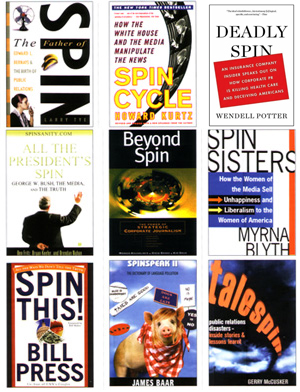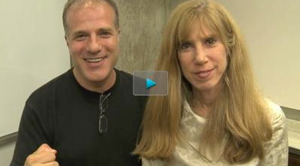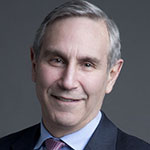The eight PRSA/NY ethics panelists, seven of them self-employed, will get O’Dwyer exhibits including the 1999 study that found “PR Specialist” ranked 43rd on a list of 45 credible info sources.
 The question of whether PR people “practice deception,” the topic of tonight’s panel, webcast at 6:30 p.m. via www.livestream.com/sunyglobalcenter was decided by the $150K PRSA/Rockefeller Foundation study that polled 2,500 people and took five years to complete.
The question of whether PR people “practice deception,” the topic of tonight’s panel, webcast at 6:30 p.m. via www.livestream.com/sunyglobalcenter was decided by the $150K PRSA/Rockefeller Foundation study that polled 2,500 people and took five years to complete.
PR specialists ranked just above “famous entertainer” and “TV talk show hosts” in credibility. They were lower than “political party leader” and “head of a national interest group.” At the top were Supreme Court justice, teacher, national expert, member of the armed forces and national business owner.
There's no doubt that PR in the public's mind is equated with spin, a polite word for deception. There are at least ten books about PR and PR people with the word "spin" in the title.
Study Was a Pivotal Society Moment
The credibility study was a watershed moment for the Society that had a huge and long-lasting impact on it. This is history that the ethics panelists should know about and which is being e-mailed to them.
The Society was so embarrassed by the results that no press conference was held. The results were told at a session in Rockefeller Foundation offices just before the Fourth of July to which the O’Dwyer Co. was not invited.
No Society publication ever carried the list of the 45. There was only a brief story on an inside page of Tactics.
The Society at that time had only one senior PR person on the staff to combat the wave of negative comments that ensued—Richard George. He quit in September, just before the national conference.
Another negative that hit the Society that year was the charge by the Exterior Insulating Finishing System industry that the firm of treasurer Lee Duffey was operating a front group for brick interests that was unfairly attacking EIFS. Duffey normally would have moved up to president-elect but the Assembly picked Kathy Lewton. A two-year study by the Fellows found that accreditation had little impact in the job market.
Sam Waltz, 1999 president, beset with questions from the O’Dwyer Co. on the credibility study and the charges against Duffey, said O’Dwyer’s was taking up too much staff time and declared a formal boycott against the company.
A member then formally charged the board with violating five articles of the Ethics Code. Rather than take up such charges or investigate EIFS industry charges against members of the Duffey firm, the board scraped the Code. A new Code, sans enforcement provisions, was created at a cost of $200K.
Society membership was 19,266 in 2000. Currently it is about 21,000--virtually no growth in 15 years. PR specialists grew 21% from 166,630 in 2004 to 202,530 in 2013, according to the U.S. Dept. of Labor.
“PR” Has Ethical, Image Problems
Tonight’s panel needs to take a close look at the 1999 study which was conducted by such figures as Robert Shapiro, Ph.D., Columbia University, and Ronald Hinckley, former research head, U.S. Information Agency.
The more relevant question is where is PR today and where are PR people?
The term has almost disappeared from major companies, replaced by corporate communications, public affairs, etc. Blue chip PR Seminar inducted 35 new members in June and not one had PR in his or her title.
Companies, PR firms and ad agencies a couple of decades ago had a dedicated PR person available 24/7 who could at least chat on the phone with newspeople and provide some help. Communication now is almost all via-e-mail. Reporters post questions in boxes on corporate websites, hoping for a reply.
 PR people are not only interfacing far less with the press but also far less with each other. Almost none of the 25 New York PR groups that met a couple of decades ago still exist. PR Society: New York gave up the ghost last year after 50 years.
PR people are not only interfacing far less with the press but also far less with each other. Almost none of the 25 New York PR groups that met a couple of decades ago still exist. PR Society: New York gave up the ghost last year after 50 years.
The Centre for Corporate PA, Australia, a blue chip group similar to the Arthur W. Page Society, declared in a five-page essay last year that “PR Is Dead.”
Author Wayne Burns, who had 20 years in corporate PR, journalism and politics, including a stint with Hill+Knowlton, said PR’s usefulness has been “terminal since the late 1990s,” surviving only on the “tactical fringes of marketing communications.”
Social Media Influencers Replace PR
PR specialists are now called "social media influencers," Richard Batyko of the Akron chapter of PRSA noted in his pitch to join the 2015 national board. All candidates stressed the importance of social media including chair-elect candidate Mark McClennan, who says he "helped lead the social media adoption at our agency.”
Significant is that seven of the eight panelists are self-employed or head their own firms—writers Randy Cohen, Fran Hawthorne and Paul Holmes; Steve Cody of Peppercomm; Doug Simon of D S Simon Productions; and Jacqueline Brevard and Delbert Spurlock The only one with a job is Michael Schubert, chief innovation officer of Ruder Finn. Fellow RF executive Emmanuel Tchividjian is conducting the panel.
Conspicuous by their absence is anyone from a major company or from another major PR firm. The topic of ethics can get into highly controversial subjects and the byword in the PR industry these days is “keep your head down.”
|
|
Tonight’s panelists have a lot more freedom in speaking than PR people whose bosses are watching their every word.
The panel coordinates with national’s celebration of September as “Ethics Awareness Month.”
Do Something Ethical!
We would like it to do something ethical, namely urge the national Society to scrap its boycott against the O’Dwyer Co.
The chapter initially had barred the press from tonight’s session. But we noted that doing so tarnished the image of PR and the chapter and especially the images of the sponsors of the panel—Cision, PR Newswire, Dow Jones’ Factiva database, Brandpoint, RCM Communications and D S Simon Productions.
Cision, which has contact points for hundreds of thousands of editors, has been acquired by the GTCR’s Grand Canyon Holdings and merged with Vocus, a similar service. GTCR, a $12 billion operation, does not want to be involved in press-boycotting antics. Neither do any of the other sponsors.
The 2000 Society board, under a hail of criticism from 22 leading PR figures including 11 Fellows, erased the boycott of the 1999 board at its first meeting.
National’s press boycott tarnishes the names of its sponsors including the Associated Press, BusinessWire, Cision/Vocus, Gorkana, Allstate and MarketWired, all $20,000 Gold sponsors of the 2014 conference Oct. 11-14 in Washington, D.C., the seat of our democracy.



 Helga Ying, who is in charge of International AIDS Society’s offices in San Francisco and Oakland, is moving to Edelman as global and US chair of Purpose.
Helga Ying, who is in charge of International AIDS Society’s offices in San Francisco and Oakland, is moving to Edelman as global and US chair of Purpose.  Emmanuel Tchividijian, who was senior VP/chief ethics officer at Ruder Finn in a 20-year stint, has established
Emmanuel Tchividijian, who was senior VP/chief ethics officer at Ruder Finn in a 20-year stint, has established  Every profession needs codes of conduct to help ensure the credible performance of its members. The public relations profession has several codes aimed at building and sustaining positive behavior but none of them addresses how practitioners must write for PR and related business purposes. (3 reader comments)
Every profession needs codes of conduct to help ensure the credible performance of its members. The public relations profession has several codes aimed at building and sustaining positive behavior but none of them addresses how practitioners must write for PR and related business purposes. (3 reader comments) Workplace diversity Issues, ranging from race to gender, have long been high profile threats to the brand. Ageism has been the exception - until now. (2 reader comments)
Workplace diversity Issues, ranging from race to gender, have long been high profile threats to the brand. Ageism has been the exception - until now. (2 reader comments) There's a battle for truth, in which people no longer share common facts and are unable to have a rational debate, Richard Edelman said during his speech at USC Annenberg School of Communication and Journalism on April 12. (1 reader comment)
There's a battle for truth, in which people no longer share common facts and are unable to have a rational debate, Richard Edelman said during his speech at USC Annenberg School of Communication and Journalism on April 12. (1 reader comment)


 Have a comment? Send it to
Have a comment? Send it to 
No comments have been submitted for this story yet.